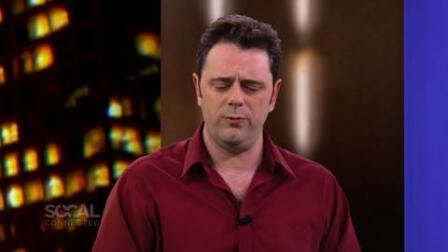
Faces of Three Strikes: What Passing Prop 36 Means for Both Sides
For 18 years, California had one of the toughest "Three Strikes" laws in the country. A third felony -- violent or not -- could lock up a criminal for life. But this last election, Californians voted to change that law. Now, thousands of offenders who thought they'd never see freedom, might. Their families have new hope, but victims' groups are feeling betrayed. They're warning of chaos and a spike in crime. The law may have changed; hearts and minds -- that's another matter.
Transcript:
Jennifer London: For the last 18 years, there's been heartbreak on both sides of California's Three Strikes Law. For the family of a victim -- a beloved daughter and sister, murdered at 18.
Michael Reynolds/Brother of Murder Victim: She was a great kid. Grew up together, and she was just a wonderful friend. And I really miss her.
London: And in another case, for the family of a convicted felon -- a son and father put away for 25 years to life on a disputed domestic abuse charge.
Margaret Ibarra/Mother of Convicted Felon: He wasn't violent, or you know, a hardened criminal. He worked. He was a truck driver. He drove all over California. And he loved his children.
London: Since 1994, California's Three Strikes Law has been a 'get-tough-on-crime' measure designed to put repeat offenders of violent or serious crimes away for 25 years to life. Nearly half the states have a version of Three Strikes, but California's has been the strictest. And in some cases, non-serious and non-violent felonies, like drug possession or petty theft, have triggered one of these sentences. The passage of Prop 36 will now change that.
In Orange County, Michael Reynolds plays in the yard with his twin daughters, both named for his younger sister Kimber Michelle, who was gunned down at just 18.
Reynolds: She was one of my best friends.
London: After Kimber's murder in 1992, the Reynolds family launched a campaign to create the Three Strikes Law in California.
Reynolds: When we found out who had killed my sister, it turns out the two men were repeat felons. They were on parole at the time, and they they had lengthy criminal histories.
London: The subsequent 1993 kidnapping and murder of 12-year-old Polly Klaas in Petaluma was the tipping point for enacting Three Strikes.
On a warm Sunday, just a few days before voters would decide the outcome of Prop 36, we met 81-year-old Margaret Ibarra. She traveled from her home in El Monte to attend mass at the Dolores Mission Church in Boyle Heights.
And after communion, she campaigns for her son Lino's freedom from his Three Strikes sentence.
Ibarra [in Spanish]: We have fought many years. She and I, many years.
London: Lino had two previous drug felonies, but Ibarra says his third strike for domestic abuse doesn't warrant life in prison.
London [to Ibarra]: The flyers that you're passing out are to campaign for the passage of Prop 36.
Ibarra: Yes. And to see what they've gone for. None of them are killers or murderers. There's a man there that did a license for his cousin.
London: And that's where the debate over the fairness of Three Strikes takes root -- in the hearts and souls of people whose lives have been forever changed by crime and punishment.
London [to Reynolds]: Do you believe in second chances?
Reynolds: Sure.
London: Some people say that Prop 36 is really just about giving people second chance.
Reynolds: Well, the problem is that when that second chance comes after you've already had two serious or violent crimes in your background, then that next chance is most likely going to come at the expense of somebody else. And it's going to be an expense that is paid in blood.
London: Do you think that the Three Strikes Law which was implemented in 1994 should never have been passed in the first place?
Reynolds: No, I'm not saying that. I'm saying it should be for what it was supposed to be. I voted for it because this law was made for a girl that was killed and raped. That's what it was intended for. We got into it in a frenzy, but the punishment doesn't fit the crime. I'm sorry. It doesn't.
Reynolds: The problem is the sympathy is misdirected. It is directed towards the offender rather than towards the victim.
Ibarra: There's hundreds of kids left behind because of this law, for one reason or another.
Reynolds: The job of the criminal justice system is not to make sure that families of criminals are able to stay together. It's not society putting their families at jeopardy.
London: Supporters of amending Three Strikes say California's entire prison system is in jeopardy. Last year, the U.S. Supreme Court ruled that conditions in the state's prisons constituted "cruel and unusual punishment," ordering a number of inmates released because of extreme over-crowding and lack of medical attention.
California's prison system is home to approximately 137,000 inmates, 8,800 of those are considered third-strikers. With the passage of Prop 36, roughly 4,000 of those third-strikers may be eligible for re-sentencing if their third strike conviction is not considered serious or violent. That means many may be released.
Mona Lynch, a criminologist at the University of California, Irvine, says changes to the Three Strikes Law are overdue.
Mona Lynch: It's really an opportune time, and CA is going through a sea change on punishment policy. We have a particular sort of budget problem, constitutional problem, legal problem in the prison system, so it seems like a perfect storm to think through what are the other ways that we can start to reform our system so that's it's smart, not just excessive on crime.
London: Excessive because Lynch says the Three Strikes Law was originally too broad, giving life sentences to people who are unlikely to be a threat to public safety.
Lynch: Because of its breadth, it also captures people who may have had some mistakes as a youth, some serious mistakes even as a youth, have basically lived law-abiding lives, and then go on to get in trouble later. And some of the ways that people can get in trouble later are relatively minor in the scope of things.
London: And lynch says the crime rate county by county calls into question how effective the law has been. Between 1994 and 2010, Kern County has used Three Strikes the most, and saw its crime rate drop 31 percent. Compare that to San Francisco County, which rarely prosecutes Three Strikes cases. Its crime rate dropped about 49 percent in the same period.
The man who has been on the front lines, both using and debating Three Strikes, is outgoing L.A. District Attorney Steve Cooley. Although he believes locking up repeat offenders is the right thing to do, the original law went too far.
Steve Cooley: I urged, over and over again, that we reconsider our Three Strikes policy here in Los Angeles County and include the nature of the new offense as part of a major factor in determining whether to seek 25 to life. Other prosecutors used it very, very, very aggressively even when the offense was relatively minor like stealing food, you know, simple possession of drugs.
London: Cooley says passing Prop 36 is about making the law more even-handed and humane, not about repealing Three Strikes.
Cooley: And that's why I think Proposition 36 finally is fine tuning a very good recidivist law by eliminating the possibility of abuse. The people of the State of California, the voters, its their law, and I think they've made a nice and appropriate change to their law.
London: But that is cold comfort for families of victims.
Reynolds: I would be lying if I said it was not personal to me, but we push forward with our efforts to enhance public safety.
London: In the name of your sister?
Reynolds: In the name of all Californians. In the name of my sister, in the name of thousands of other crime victims, and in the name of millions of people that I hope never are crime victims.
Ibarra [to grandson]: You're hungry?
London: For Margaret Ibarra, she will continue to raise her grandson Michael.
Ibarra: [to grandson]: You got a game tomorrow?
London: Just as she did for her son Lino's two other children. And even though Prop 36 passed, her work is not done yet.
Ibarra: I'm not gonna die without fighting. I was pleading for prisoners' rights. They have a right. They're human beings.
London: This is bigger than your son and your family.
Ibarra: Yes, it's gotta be for everybody. It's gonna be for everybody.
London: When it comes to crime and punishment, there may be law and order, but it's the grandmothers and brothers, and all those affected, on both sides, who are stuck somewhere in the middle.























